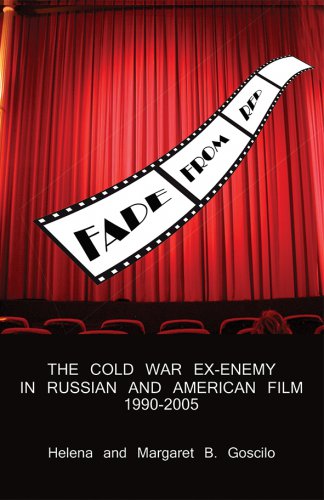
About the Author
Helena Goscilo, Professor of Slavic at the Ohio State University, writes primarily on culture, gender, and visual genres in Russia. Her book-length publications in the last four years include Cinepaternity: Fathers and Sons in Soviet and Post-Soviet Film (co-ed., Indiana UP 2010), Reflections and Refractions: The Mirror in Russian Culture (Studies in 20th and 21st Century Literature 2010/2011), Celebrity and Glamour in Contemporary Russia: Shocking Chic (co-ed., Routledge 2011), Putin as Celebrity and Cultural Icon (ed., Routledge 2012), Embracing Arms: Cultural Representations of Slavic and Balkan Women in War (co-ed., Central European UP 2012), and Baba Yaga: The Wild Witch of the East in Russian Fairy Tales (co-ed., UP of Mississippi 2013). Among her current projects are a volume preliminarily titled Fame in Flight: Russian Aviation (with Vlad Strukov) and the monograph Graphic Ideology: The Soviet Poster from Stalin to Yeltsin.
Margaret B. Goscilo, Senior Lecturer in English at the Ohio State University, has written on fiction, women’s & gay studies, art, translation, and film. Her publications include The Bastard Hero in the Novel (Garland Press 1990), “Deconstructing The Terminator” (Film Criticism 1988), “Jane Eyre and Pictorial Representation” (MLA’s Teaching Approaches to Jane Eyre 1993), “John Fowles’s Pre-Raphaelite Woman: Interart Strategies and Gender Politics” (Mosaic 1993), “Forster’s Italian Comedies: Que[e]rying Heterosexuality Abroad” (Seeing Double: Revisioning Edwardian & Modernist Literature St. Martin’s Press 1996), “On English Translations of Stendhal’s Le Rouge et le noir” (Encyclopedia of Literary Translation into English Fitzroy Dearborn 2000), and “William Archer,” “William Powell Frith,” “John Singer Sargent,” “Women Artists” (Grolier Encyclopedia of the Victorian Era 2004).
FADE FROM RED: The Cold War Ex-Enemy in Russian and American Film 1990-2005
Helena and Margaret B. GosciloNew Academia Publishing, 2014
428 Pages, 42 Illustrations
ISBN 978-0-9906939-1-8 Paperback
For BULK ORDERS, order directly from New Academia Publishing.
Queries: orders@newacademia.com
About the Author
Helena Goscilo, Professor of Slavic at the Ohio State University, writes primarily on culture, gender, and visual genres in Russia. Her book-length publications in the last four years include Cinepaternity: Fathers and Sons in Soviet and Post-Soviet Film (co-ed., Indiana UP 2010), Reflections and Refractions: The Mirror in Russian Culture (Studies in 20th and 21st Century Literature 2010/2011), Celebrity and Glamour in Contemporary Russia: Shocking Chic (co-ed., Routledge 2011), Putin as Celebrity and Cultural Icon (ed., Routledge 2012), Embracing Arms: Cultural Representations of Slavic and Balkan Women in War (co-ed., Central European UP 2012), and Baba Yaga: The Wild Witch of the East in Russian Fairy Tales (co-ed., UP of Mississippi 2013). Among her current projects are a volume preliminarily titled Fame in Flight: Russian Aviation (with Vlad Strukov) and the monograph Graphic Ideology: The Soviet Poster from Stalin to Yeltsin.
Margaret B. Goscilo, Senior Lecturer in English at the Ohio State University, has written on fiction, women’s & gay studies, art, translation, and film. Her publications include The Bastard Hero in the Novel (Garland Press 1990), “Deconstructing The Terminator” (Film Criticism 1988), “Jane Eyre and Pictorial Representation” (MLA’s Teaching Approaches to Jane Eyre 1993), “John Fowles’s Pre-Raphaelite Woman: Interart Strategies and Gender Politics” (Mosaic 1993), “Forster’s Italian Comedies: Que[e]rying Heterosexuality Abroad” (Seeing Double: Revisioning Edwardian & Modernist Literature St. Martin’s Press 1996), “On English Translations of Stendhal’s Le Rouge et le noir” (Encyclopedia of Literary Translation into English Fitzroy Dearborn 2000), and “William Archer,” “William Powell Frith,” “John Singer Sargent,” “Women Artists” (Grolier Encyclopedia of the Victorian Era 2004).
About the book
This study investigates the close correlation between politics and mainstream cinema vividly evidenced in Russian and American screen images of the former Cold War enemy from 1990 to 2005. Whereas glasnost and the demise of the Soviet Union ushered in a period of official cooperation that soon inflated into rhetorical declarations of partnership, the fifteen years under examination saw the gradual deterioration of relations after the initial euphoria, culminating in a partial resumption of mutual Cold War recriminations.
The American blockbusters under analysis outnumber the major Russian selections because of the notorious discrepancy in production volume between Hollywood and Russian studios (especially during the 1990s)—an incommensurability bemoaned by representatives of the Russian film industry. Moreover, while we recognize that widely advertised money-making blockbusters may provide a more reliable index of both official priorities and vox populi, we have included a number of smaller-scale or financially less successful films that encapsulate the political agenda of a given period. Considerations of length influenced our process of selection, which favored eloquent illustration over automatic exhaustiveness.
Praise
“The authors take an innovative transnational approach, analyzing the ways that Russian and American films cast the former Cold War enemy in the fifteen years after the conflict’s end. Helena and Margaret Goscilo’s study is dense, well-written, full of insights, and makes an important contribution to Russian/American film studies as well as scholarly works on the cultural Cold War.” —Stephen Norris, Associate Professor of History, Miami University, and author of Blockbuster History in the New Russia: Movies, Memory, and Patriotism
“This is a splendid book. It’s what every scholarly book should be, but almost never is: superbly researched, vividly written, intrinsically interesting. The Goscilos tell a fascinating story: how Russian and American cinema continued to shape perceptions of the “other” after Cold War tensions had supposedly faded. It should be read by everyone interested in post-Cold War history, Russian and American culture, and the politics of cinema.” ―Denise Youngblood, Professor of History, University of Vermont and author of Russian War Films: On the Cinema front, 1914-2005.





 Coming Soon
Coming Soon Awards
Awards